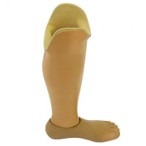Summary
Alexis Maloux
Business developper
Technology
- Device based on new materials to make tibial prostheses more comfortable.
- Better adaptation of the socket to the residual limb by conforming to its volume variations, thus allowing a better fit and therefore improved comfort.
- The technology can be adapted to any stump shape and any prosthesis attachment system.
- Real-time adaptation to volume variations for better pressure distribution and vascularization.
- Reduction of shocks, vibrations, and pistoning effects.
- Ease of production (industrial series or custom-made).

Market
- Every year, thousands of people undergo lower limb amputation as a result of trauma, cancer, or diabetes. The stump often remains sensitive, and wearing a prosthesis is often uncomfortable or painful.
- The mechanical discomfort caused by pistoning effects can be reduced with a sock and a suitable prosthesis retention mechanism, but this solution is unsuitable for pain related to changes in stump volume. These volume changes can be caused by temperature variations, vasodilation, physical activity, etc., and the sockets are not flexible enough to adapt to them.
Development
- Device development: 3D printing and integration into a silicone socket.
- Real-life evaluation: tested on an amputee for 24 hours.
IP
- Asset currently being established
Valorisation strategy
- Co-development
- Licensing
